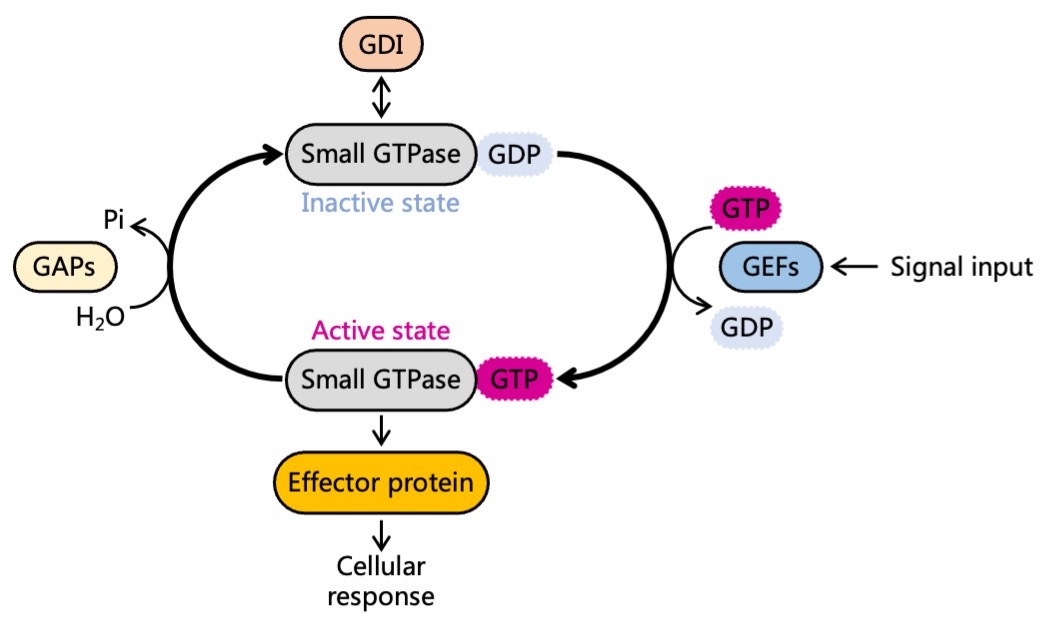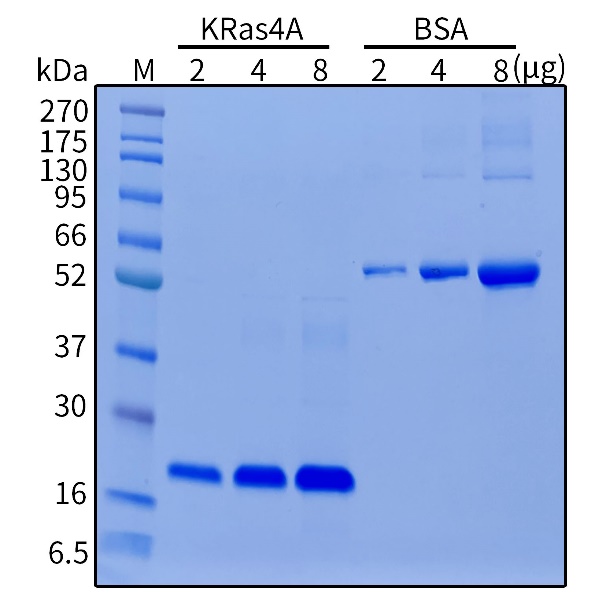| Species | Gene ID | Accession | Source | Length | MW | Tag |
| Human | 3845 | P01116 | E.coli | 194aa | ~22kDa | N-His Tag |
| 蛋白信息(About this protein) | |
| 名称(Name) | Recombinant Human KRas4A; 重组人KRas4A蛋白 |
| 别名(Synonyms) | KRAS, C-K-RAS, CFC2, K-RAS2A, K-RAS2B, K-RAS4A, K-RAS4B, KI-RAS, KRAS1, KRAS2, NS, NS3, RALD, RASK2, K-ras, KRAS proto-oncogene, GTPase, c-Ki-ras2, OES, c-Ki-ras, K-Ras 2, 'C-K-RAS, K-Ras, Kirsten Rat Sarcoma virus, Kirsten Rat Sarcoma virus |
| 产品简介 (Background) |
Beyotime’s recombinant human KRas4A (rhKRas4A) was expressed in E.coli and purified, which contain the mature form KRas4A (2-186aa) fusion with 6X His tag (HHHHHH) at the N-terminus. Ras (KRas, HRas and NRas) is the most frequently mutated gene family in cancers,they differ significantly only in the C-terminal 40 amino acids. These Ras genes have GTP/GDP binding and GTPase activity, and their normal function may be as G-like regulatory proteins involved in the normal control of cell growth. Ras directly interacts with and activates several downstream effector pathways including the mitogen-activated protein kinase (MAPK) and phosphatidylinositol 3-kinase (PI3K) pathways. Mutations in Ras gene disrupt the guanine exchange cycle, typically by becoming GAP-independent and ‘locking’ Ras in the active, GTP-bound state, thereby activating downstream signaling pathways resulting in tumor cell growth. KRas was first identified as a viral oncogene in the Kirsten Rat Sarcoma virus and KRas protein was first found as a p21 GTPase. The protein relays signals from outside the cell to the cell’s nucleus. These signals instruct the cell to grow and divide (proliferate) or to mature and take on specialized functions. The KRas gene encodes two highly related protein isoforms, KRas4B and KRas4A, which consist of 188 and 189 amino acids, respectively, due to different clipping of the fourth exon in mammalian cells. These proteins have different structures in their C-terminal region. KRas4B contains a polybasic stretch of eight lysines and KRas4A presents a palmitoylated cysteine and two polybasic regions. The localization and trafficking of KRas4B relies on the presence of polybasic residues that anchor the protein to the inner leaflet of the plasma membrane, whereas the membrane-targeting signals in KRas4A are two polybasic regions and an additional palmitoyl group, that independently contribute to the plasma membrane localization and signal output. Mutations in KRas are associated with a variety of malignancies, including lung adenocarcinoma, mucinous adenoma, ductal carcinoma of the pancreas and colorectal cancer [1]. |
| 产品用途 (Applications) |
Recombinant Human KRas4A is useful in studying KRas4A interacting proteins, effectors, GAPs (GTPase-activating proteins) and GEFs (Guanine nucleotide-exchange factors). It can also be used as positive control in Western blots. |
| 外观 (Physical appearance) |
Liquid |
| 活性 (Biological activity) |
The specific activity of KRas4A was 0.93 nmol/min/mg in GTPase activity assay. |
| 浓度 (Concentration) |
1mg/ml |
| 纯度(Purity) | ≥ 95% by SDS-PAGE |
| 储存液 (Storage buffer) |
20mM HEPES (pH7.4), 200mM NaCl, 1mM EDTA, 2mM DTT, 5% glycerol |
小GTP酶(Small GTPase),也称Small G-proteins、Ras superfamily,是调节真核细胞信号转导、细胞增殖、细胞骨架重组和细胞内膜转运等过程的分子开关,小GTP酶通过结合和水解GTP,在“激活”和“静息”状态之间循环:在外界信号的刺激下,鸟苷酸交换因子(Guanine nucleotide-exchange factors, GEFs)辅助小GTP酶将结合的GDP置换为GTP,小GTP酶结合GTP进入激活状态(Active state);激活状态的小GTP酶与下游效应蛋白(Effector protein)相互作用,从而刺激细胞发生相应的响应;GTP酶激活蛋白(GTPase-activating proteins, GAPs)催化小GTP酶结合的GTP水解为GDP,并释放自由磷酸盐(Free phosphate, Pi),此时小GTP酶结合GDP进入静息状态(Inactive state),鸟嘌呤核苷酸解离抑制蛋白(Guanine nucleotide dissociation inhibitors, GDIs)抑制小GTP酶释放GDP,直到GEFs受到刺激信号再次开启新一轮的循环(图1) [2-3]。

图1. 小GTP酶在“激活”和“静息”状态之间循环的原理图。
小GTP酶在人类中已发现超过150个家族成员,在果蝇(Drosophila)、秀丽隐杆线虫(C. elegans)、酿酒酵母(S. cerevisiae)、粟酒裂殖酵母(S. pombe)、黏菌(Dictyostelium)和植物中也都发现了保守的同源物。小GTP酶根据结构和功能被分为5个家族分支:Ras家族、Rho家族、Ran家族、Rab家族和Arf家族。Ras家族本身又被分为6个亚家族:Ras亚家族、Ral亚家族、Rit亚家族、Rap亚家族、Rheb亚家族和Rad亚家族[4]。
Ras家族(Ras homologous GTPases)是调节肌动蛋白重组的关键因子,因此在肌动蛋白细胞骨架完整性、细胞增殖、细胞分化、细胞粘附、细胞凋亡和细胞迁移等细胞过程中发挥着重要作用。目前有16个成员被发现,被分为6个亚家族(见下表),其中HRas、NRas和KRas研究的最为广泛[5]。
| Subfamily | Ras | Ral | Rit | Rap | Rheb | Rad |
| Subfamily members | HRas NRas KRas4A KRas4B |
RalA RalB |
Rit1 Rit2 |
Rap1A Rap1B Rap2A Rap2B Rap2C |
Rheb RhebL1 |
RRad |
本产品经SDS-PAGE电泳检测蛋白纯度和分子量参考图2。

图2. 碧云天Recombinant Human KRas4A (P2405)的SDS-PAGE电泳检测图。本蛋白经BeyoGel™ Plus PAGE预制胶(Tris-Gly, 4-15%, 10孔) (P0465)电泳,Marker为BeyoColor™彩色预染蛋白分子量标准(6.5-270kD) (P0071/P0072),并经BeyoBlue™考马斯亮蓝超快染色液(P0017F)染色。实际检测结果可能会因样品和检测条件等的不同而存在差异,图中数据仅供参考。
包装清单:| 产品编号 | 产品名称 | 包装 |
| P2405-10μg | Recombinant Human KRas4A (His-Tag) | 10μg |
| P2405-100μg | Recombinant Human KRas4A (His-Tag) | 100μg |
| P2405-1mg | Recombinant Human KRas4A (His-Tag) | 1mg |
| - | 说明书 | 1份 |
-20ºC保存,一年有效。-80ºC保存,可以保存更长时间。
注意事项:由于蛋白每次冻融均会引起部分失活,所以首次配制成相应浓度的储存液后,须分装后-20ºC或更低温度冻存,尽量避免反复冻融。
本产品仅限于专业人员的科学研究用,不得用于临床诊断或治疗,不得用于食品或药品,不得存放于普通住宅内。
为了您的安全和健康,请穿实验服并戴一次性手套操作。
| 产品编号 | 产品名称 | 包装 |
| P2061-1ml | Rhotekin-RBD Agarose (活性Rho结合琼脂糖凝胶) | 1ml |
| P2063-10μg | Recombinant Human RhoA (Flag-Tag) | 10μg |
| P2063-100μg | Recombinant Human RhoA (Flag-Tag) | 100μg |
| P2063-1mg | Recombinant Human RhoA (Flag-Tag) | 1mg |
| P2065S | Active Rho Pull-down and Detection Kit | 50次 |
| P2065M | Active Rho Pull-down and Detection Kit | 250次 |
| P2401-10μg | Recombinant Human NRas (Flag-Tag) | 10μg |
| P2401-100μg | Recombinant Human NRas (Flag-Tag) | 100μg |
| P2401-1mg | Recombinant Human NRas (Flag-Tag) | 1mg |
| P2403-10μg | Recombinant Human HRas (His-Tag) | 10μg |
| P2403-100μg | Recombinant Human HRas (His-Tag) | 100μg |
| P2403-1mg | Recombinant Human HRas (His-Tag) | 1mg |
| P2405-10μg | Recombinant Human KRas4A (His-Tag) | 10μg |
| P2405-100μg | Recombinant Human KRas4A (His-Tag) | 100μg |
| P2405-1mg | Recombinant Human KRas4A (His-Tag) | 1mg |
| P2407-10μg | Recombinant Human KRas4B (His-Tag) | 10μg |
| P2407-100μg | Recombinant Human KRas4B (His-Tag) | 100μg |
| P2407-1mg | Recombinant Human KRas4B (His-Tag) | 1mg |
| P2409-10μg | Recombinant Human KRas4B (G12C, His-Tag) | 10μg |
| P2409-100μg | Recombinant Human KRas4B (G12C, His-Tag) | 100μg |
| P2409-1mg | Recombinant Human KRas4B (G12C, His-Tag) | 1mg |
| P2411-10μg | Recombinant Human KRas4B (G12D, His-Tag) | 10μg |
| P2411-100μg | Recombinant Human KRas4B (G12D, His-Tag) | 100μg |
| P2411-1mg | Recombinant Human KRas4B (G12D, His-Tag) | 1mg |
| P2413-10μg | Recombinant Human KRas4B (G12V, His-Tag) | 10μg |
| P2413-100μg | Recombinant Human KRas4B (G12V, His-Tag) | 100μg |
| P2413-1mg | Recombinant Human KRas4B (G12V, His-Tag) | 1mg |
| P2415-10μg | Recombinant Human KRas4B (G13D, His-Tag) | 10μg |
| P2415-100μg | Recombinant Human KRas4B (G13D, His-Tag) | 100μg |
| P2415-1mg | Recombinant Human KRas4B (G13D, His-Tag) | 1mg |
| P2417-10μg | Recombinant Human KRas4B (G13S, His-Tag) | 10μg |
| P2417-100μg | Recombinant Human KRas4B (G13S, His-Tag) | 100μg |
| P2417-1mg | Recombinant Human KRas4B (G13S, His-Tag) | 1mg |
| P2419-10μg | Recombinant Human KRas4B (Q61H, His-Tag) | 10μg |
| P2419-100μg | Recombinant Human KRas4B (Q61H, His-Tag) | 100μg |
| P2419-1mg | Recombinant Human KRas4B (Q61H, His-Tag) | 1mg |
| AF0273 | Ras Rabbit Polyclonal Antibody | 50μl |
| AF1168 | Ras Rabbit Monoclonal Antibody | 50μl |
| AF7131 | HRas Rabbit Polyclonal Antibody | 50μl |
| AF7347 | KRAS Rabbit Polyclonal Antibody | 50μl |
| AG2391 | KRAS Rabbit Monoclonal Antibody | 50μl |
| AG2394 | KRAS Mouse Monoclonal Antibody | 50μl |